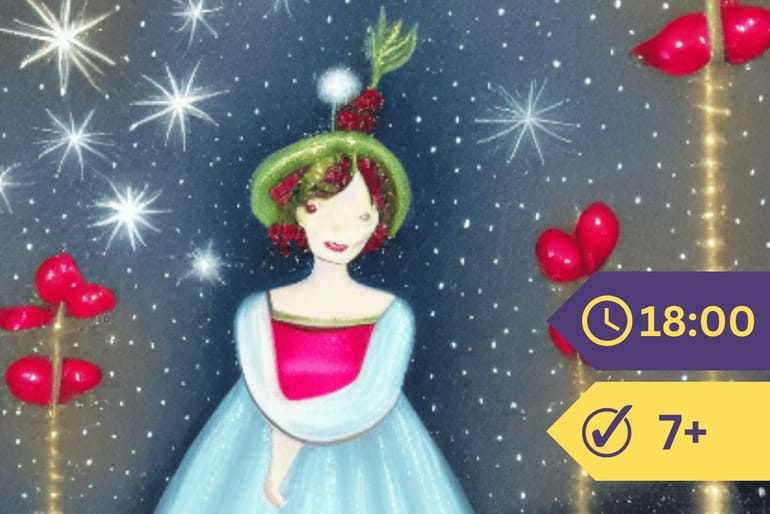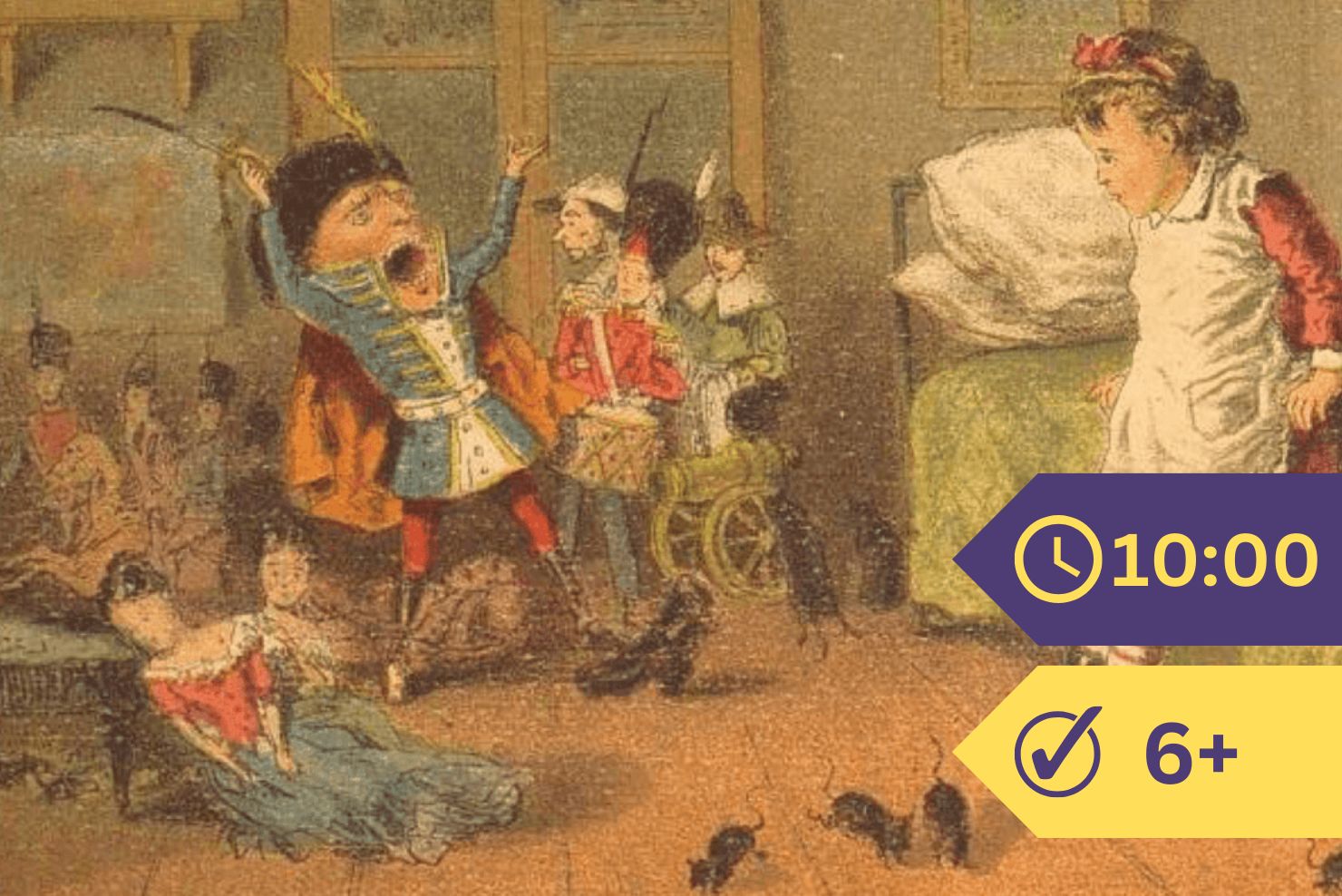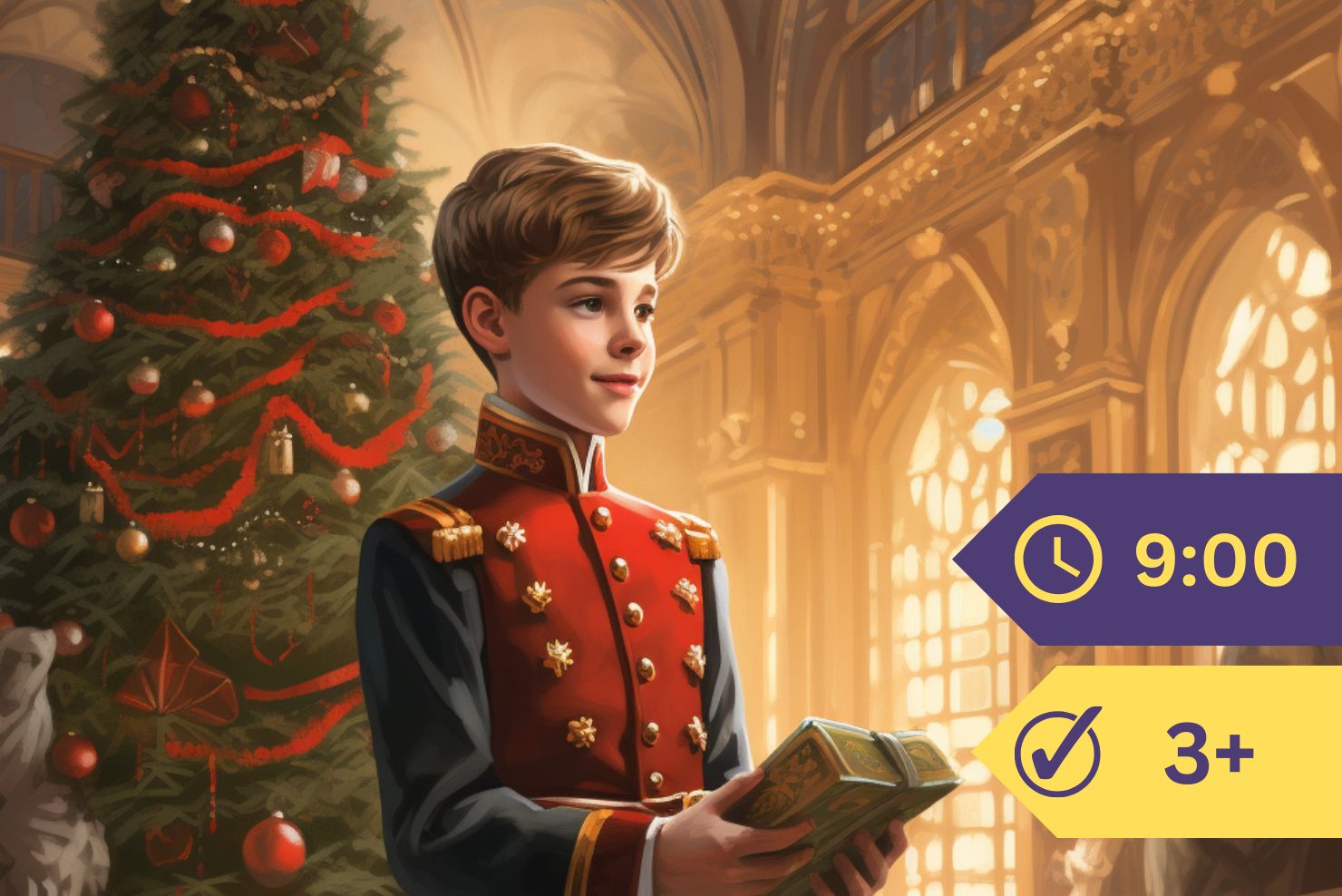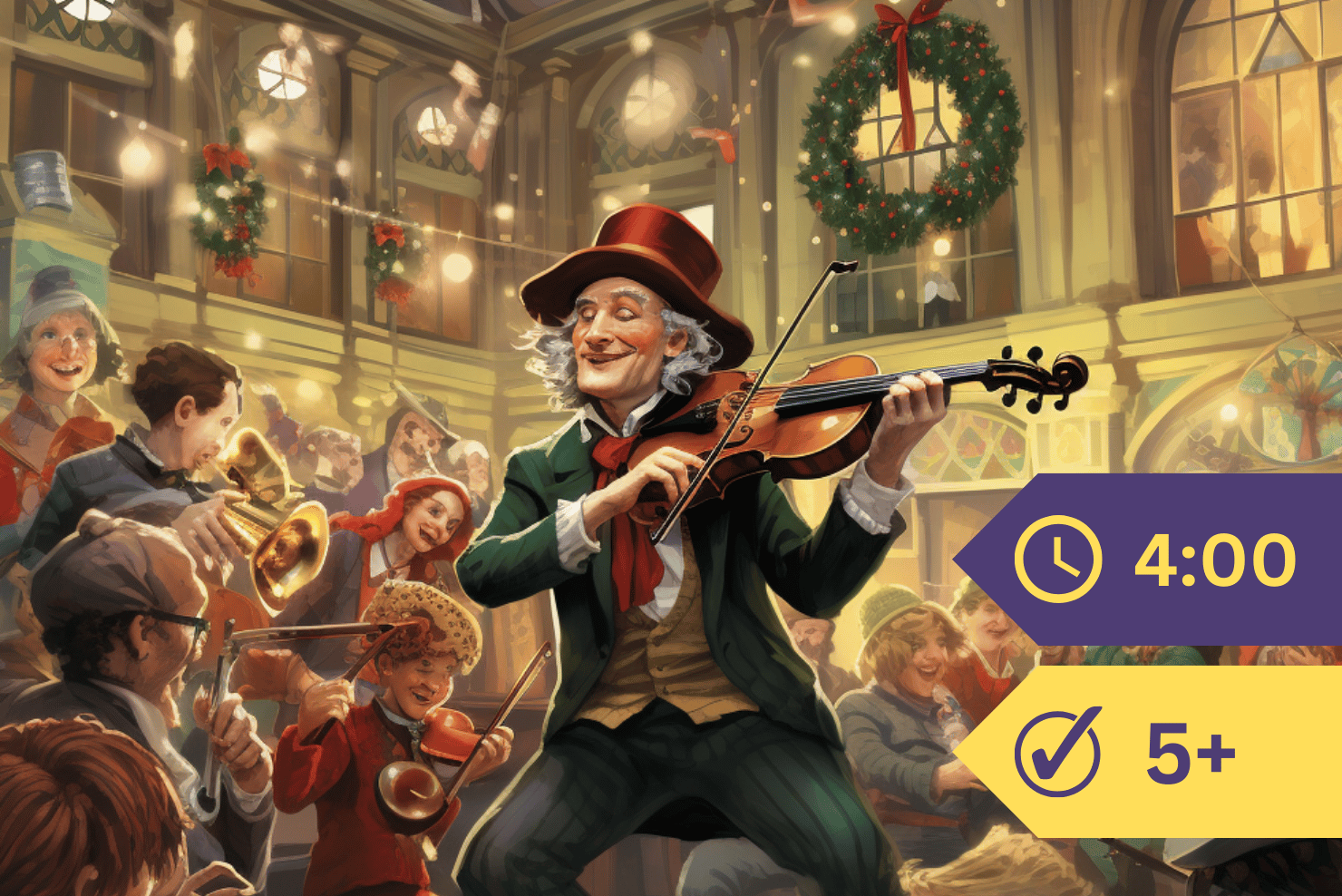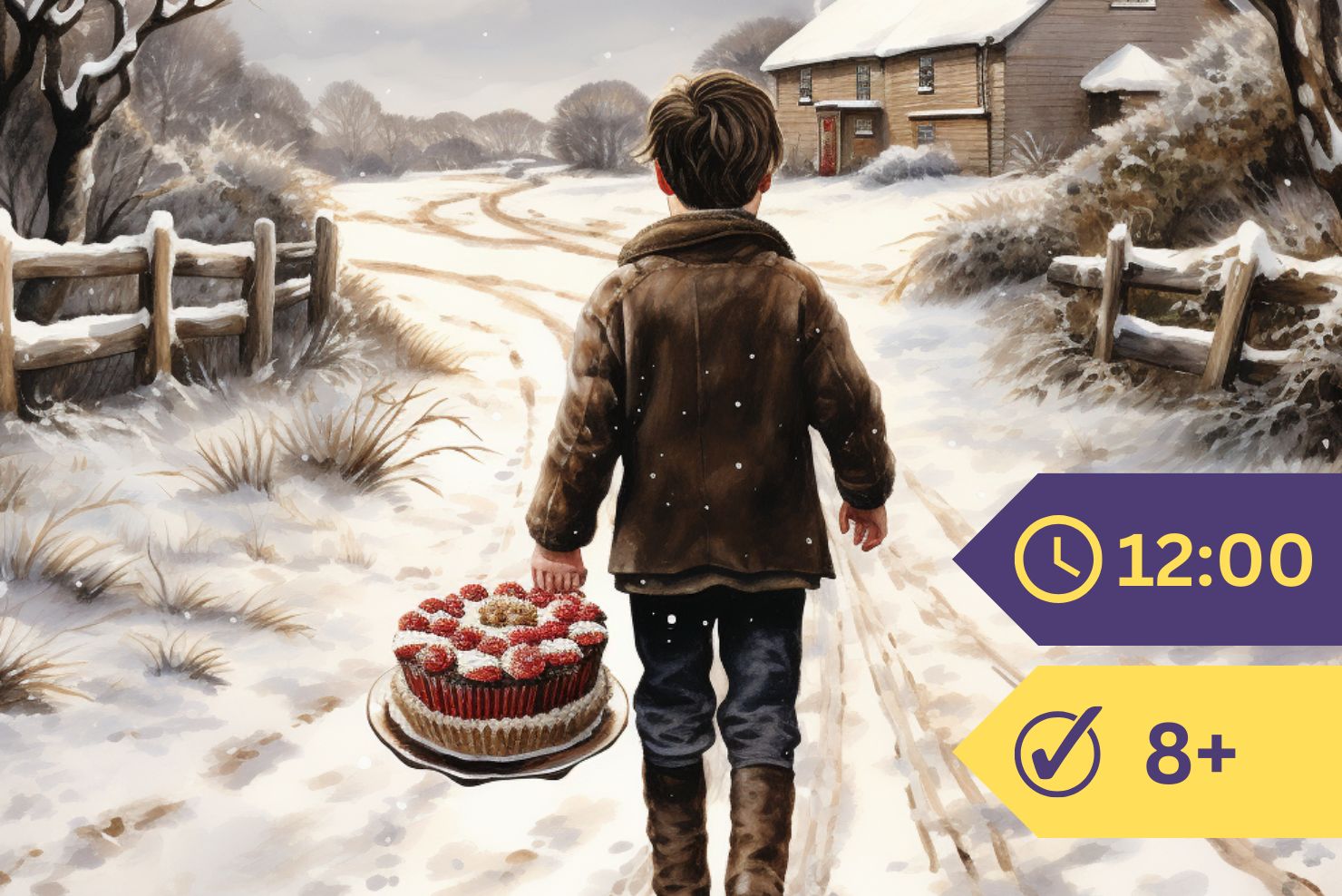Once upon a time there lived a king. His kingdom must have been large, for it was called the Kingdom of the Four Orts, which, of course, as everybody knows, means that he had possessions of the north, south, east, and west. The good King Brave-Heart, as he was called, had the help of four very wise counselors, —the four fairies of the North and the South, the East and the West.
The king was married and the queen would be having a baby soon. They were very happy, even though the queen had a tendency to be jealous and was a bit dramatic.
It was almost winter, when something strange happened. The weather had grown cold, and snowflakes had fallen before their time. The King was worried and when the next morning the ground was all white, the trees and the bushes covered with silvery foliage, he grew even more worried.
“Something is wrong,” he said. “The Fairy of the North must be on her way, and it is not yet time for her visit.”
And that very afternoon the snow fell again more heavily than before, and the frost-wind whistled down the chimneys and burst open the doors and windows, and all the palace servants went hurrying and scurrying about to make great fires and hang up thick curtains and get everything in order for the cold season, which they had not expected so soon.
“It will not last,” said the King, quietly. “In a few days there will be milder weather again.” But, nevertheless, he still looked grave. And early the next morning, as he was sitting with the Queen, who was beginning to feel a little frightened at the continuance of the storm, the double doors of the living room suddenly flew open, an icy blast filled the room, and a tall, white-shrouded figure stood before them.
“I have come to get you, Brave-Heart,” she said. “You are needed in my part of the world. The people are starving: the season has been a poor one. Nothing will save their lives or prevent suffering but your own immediate presence. Are you ready? You must have seen I was coming.”
“Are you ready?” she repeated.
“Yes, I am ready!” said Brave-Heart, as he rose to his feet. But the Queen threw herself on him, with bitter crying. She didn’t want him to go, because she knew the baby would be born soon. The spirit of the North glanced at her with calm pity.
“Take courage, Claribel! Show yourself a queen. All will be well with you, believe me. But you, too, must be brave and unselfish.”
But the queen was angry and started moping. “It is not fair,” she kept saying, “it is a shame that I should suffer so. I’m sure there will be something wrong with the baby and the king won’t be here.” The king went away for several weeks and his help was greatly appreciated.
And when on Christmas Eve a beautiful little girl was born, as pretty and lively and healthy as could be, and even though the next day brought the announcement of the King’s immediate return, Claribel was still angry. Not at the king anymore, but only at the fairy for taking him.
A great feast was arranged for the little Princess. The four fairies were invited, for they would be the baby’s godmothers. And though the Queen would gladly have excluded the Northern fairy, she dared not even hint at such a thing. But she decided to do all in her power to show that that the North fairy was not welcome. When the moment arrived for the four godmothers to give their gifts to the baby, the Queen’s spite could be no longer concealed.
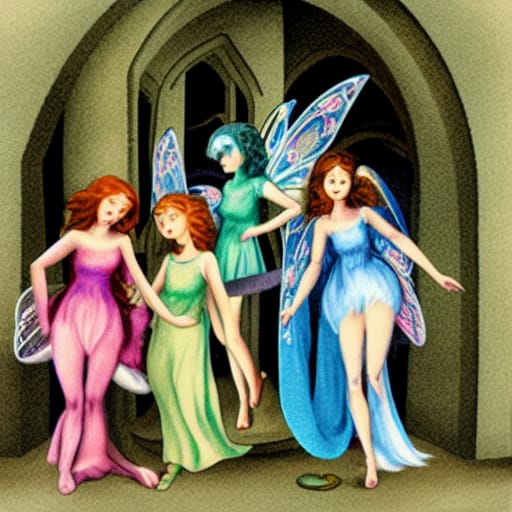
“I request,” she exclaimed, “that for reasons well known to herself, to the King, and to myself, the Northern fairy’s gift may be the last in order instead of the first.”
Everybody in the room was shocked! Because the Snow fairy, as she was also called, was the most important fairies of the four and this was a great insult. The South fairy didn’t want to give her gift first, but the Snow fairy signed to her to do it.
“I bestow upon the Princess Sweet-Heart,” she said, half tremblingly, “the gift of great beauty.”
“And I,” said the spirit of the East, who came next, “I give her great powers of intellect and intelligence.”
“And I,” said the Western fairy, “health—perfect health and strength of body, as my gift to the pretty child.”
“And you,” said the Queen bitterly, “you, cold-hearted fairy, you’ve done your best to kill me with misery, you came between my husband and me, making him neglect me as he never would have done but for your influence—what will you give my child? Will you do something to make amends for the suffering you caused? I would rather my pretty baby were dead than that she lived to endure what I have of late endured.”
“Life and death are not mine to bestow or to withhold,” said the Northern spirit calmly. “So your rash words, foolish woman, fortunately for you all, cannot touch the child. But there is something I can do, and I will. She will not know the suffering you dread for her. She shall be what you say I am. And instead of the name you have given her, she shall be known for what she is—Princess Ice-Heart.”
She turned to go, but the King and her three sisters started screaming: “Have pity!”
“Sister, change your mind!” said the Western fairy, tears springing in her blue eyes, which so quickly changed from bright to sad, “Say something to soften this hard fate. Undo it you cannot, I know. Or, at least, allow me to mitigate it if I can.”
The Snow fairy stopped; in truth, she was far from hard-hearted or remorseless, and already she was beginning to feel half sorry for what she had done.
“What would you propose?” she said coldly.
“The day the Princess of the Icy Heart shall shed a tear, her ice heart shall melt—but only then.”
Then the four fairies left. A sense of sorrow and dread hung over all who remained. Claribel flew to the baby’s cradle. The little Princess was sleeping soundly; she looked rosy and content—a picture of health.
“She seems just as usual,” she exclaimed. “Perhaps I have done no harm.”
She felt nothing but shame and regret for her own wild temper. “Perhaps,” she went on, “it was just to teach me a lesson, that the Snow fairy uttered those terrible words.”
Brave-Heart pitied his wife deeply, but he shook his head. Claribel did not answer, but her tears dropped on the baby’s face. The little Princess seemed annoyed by them. She put up her tiny hand and brushed them off. And that very evening the certainty came. The head nurse sent for the Queen while she was undressing the child, though the baby looked well, there was a strange coldness over her left side, in the region of the heart. The skin looked perfectly colorless, and the spot was stiff, as if it had been exposed to a winter night’s frost. It was no use sending for doctors—no use doing anything. Her hand when she laid it on the baby’s heart was blistered with cold.
But the baby did not mind. She flourished amazingly, heart or no heart. She was perfectly healthy, ate well, slept well, and soon gave signs of unusual intelligence. She was seldom angry, but when she was she expressed her feelings by loud roars and screams, but never with a tear! At first this did not seem strange, as no infant sheds tears during the earliest weeks of its life. But when she grew to six months old, then to a year, then to two and three, and was near her fourth birthday without ever crying, it became plain that the prediction was indeed to be fulfilled.
And the name “Ice-Heart” clung to her. In spite of all her royal parents’ commands to the contrary, “Princess Ice-Heart” she was called far and near. It seemed as if people could not help it. “Sweet-Heart we cannot name her, for sweet she is not,” was murmured by all who came in contact with her.
And it was true. Sweet she certainly was not. She was beautiful and healthy and intelligent, but she had no feeling. When her good old nurse died, she remarked coolly that she hoped her new attendant would brush her hair better; when King Brave-Heart started on some of his distant journeys she bade him good-bye with a smile, observing that if he never came home again it would be rather amusing, as she would then reign instead of him, and when she saw her mother break into sobs at her unnatural speech she stared at her in blank astonishment.
And so things went on until Ice-Heart turned seventeen. She had grown up to be gorgeous, but also strong and healthy, and very smart. She could speak in several languages, her paintings were amazing and she could play various instruments. She had also been taught to sing, but her voice was metallic and unpleasing.

Her teachers did their very best to awaken in the unfortunate girl some affection or emotion. Every day the most soul-stirring poetry was read aloud to her, the most exciting and moving dramas were enacted before her; she was taken to visit the poor of the city in their pitiable homes; she was encouraged to see sad sights. But all was in vain. She would express interest and ask intelligent questions with calm, unmoved features and dry eyes. Even music, from which much had been hoped, was powerless to move her.
“Maybe her icy heart will melt if she would fall in love,” said the queen.
“My dear!” replied the King, “to love, you must have a heart.”
“But a heart she has,” persisted the mother. “It is only, as it were, asleep—frozen.”
So men were invited, rich and poor, old and young, handsome and ugly. But all in vain. Each prince, or duke, or simple knight did his best: one would try poetry, another his flute, a third sighs and appeals, a fourth, imagining he had made some way, would attempt the bold stroke of telling Ice-Heart that unless she could respond to his adoration he would drown himself. She only smiled, and begged him to allow her to witness the performance—she had never seen anyone drown. So, one by one, the men left, some in disgust, some in strange fear, some in annoyance, preferring a more ordinary spouse than the bewitched though beautiful Princess. And for more than a year Princess Ice-Heart was left to herself—very much to her satisfaction.
But all this time the mystic sisters were not idle or forgetful. Several of the aspirants to Ice-Heart’s hand had been chosen by them. And among these, was a special protégé of the Western fairy—the young and spirited Prince Francolin. He was full of life and adventure and brightness, and his heart was warm and generous. He admired the beautiful girl, but he pitied her still more, and this pity was the real motive which made him yield to the fairy’s proposal that he should try again.
“What do you propose?” said Francolin, “She did not actually dislike me, but that is the most that can be said and however I may feel for her, however I may admire her beauty and intelligence, nothing would induce me to wed a bride who could not return my affection.”
“Ah no! I agree with you entirely,” said the fairy. “But listen—my power is great in some ways. I am well versed in ordinary enchantment, and am most willing to employ my utmost skill for my unfortunate god-daughter.” And she proceeded to arrange all the details of her plan.
After an interval of more than a year a new suitor had presented himself for the hand of the Princess Ice-Heart.
“He may try as the others have done,” said Brave-Heart, “but it is useless.” The poor King was losing all hope.
A few hours later the royal pair and their daughter, with all their attendants, in great state and ceremony, were awaiting their guest. And soon a blast of trumpets announced his approach. The curtains opened and the prince walked in. The parents and their daughter stared at each other and gasped.
Prince Jocko was a monkey!
He laid his little brown paw on his heart, bowed, coughed, sneezed, and finally began an oration. If his appearance was too funny, his words and gestures were a hundred times more so. He rolled his eyes, he declaimed, he posed and pirouetted like a miniature dancing-master, and his little cracked voice rose higher and higher as his own fine words and expressions increased in eloquence.
Then they heard a sound that they had never heard before. The Princess was laughing as if she could no longer contain herself. Clear, ringing, merry laughter. And on she went, laughing, until she flung herself at her mother’s feet, the tears rolling down her cheeks.
“Oh, mamma!” she exclaimed, “I never—” and then she went off again. But then Ice-Heart stopped laughing. She pressed her hand to her side.
“Father! mother!” she cried, “help me! help me! Am I dying? What has happened to me?” And, with a strange, long drawn sigh she sank fainting to the ground. When she woke up she turned to her father and mother with a smile such as they had never seen on her face before.
“Dearest father, dearest mother,” she said, “how I love you! Those strange warm drops that filled my eyes seem to have brought new life to me!” And the queen hugged her daughter and she was no longer ice cold.
“Sweet-Heart! my own Sweet-Heart!” she whispered. And the Princess whispered back, “Yes, call me by that name always.”
Everybody was very happy, but there was one problem. The king had promised that the one who could make her heart melt could marry her, but prince Jocko was a monkey…
“I cannot break my word,” he said, “but we might try to persuade the little monster to release me from it.”
But the Princess would not hear of this.
“No,” she said. “I owe him too deep a debt of gratitude to think of such a thing. And in his eyes I read more than I can put in words. No, dear father! you must summon him at once to be presented to our people as my husband.”
So again the cortége of Prince Jocko made its way to the palace and Sweet-Heart stood, pale, but calm and smiling, to welcome her husband. But who was this who came into the room?
“Jocko?” she murmured. “Where is Jocko? Why, this is Prince Francolin!”
“Yes, dear child,” said a bright voice beside her; and, turning round, Sweet-Heart beheld the Western fairy, who, with her sisters, had suddenly arrived. “Yes, indeed! Francolin, and no other!”
The universal joy may be imagined. Even the grave fairy of the North smiled with pleasure and delight, and, as she kissed her pretty god-daughter, she took the girl’s hand and pressed it against her own heart.
“Never misjudge me, Sweet-Heart,” she whispered. “Cold as I seem to those who have not courage to approach me closely, my heart, under my icy mantle, is as warm as is now your own.”
And so it was.
Francolin and Sweet-Heart were married, and lived happy ever after, and who knows but what, in the Kingdom of the Four Orts, they are living happily still?

